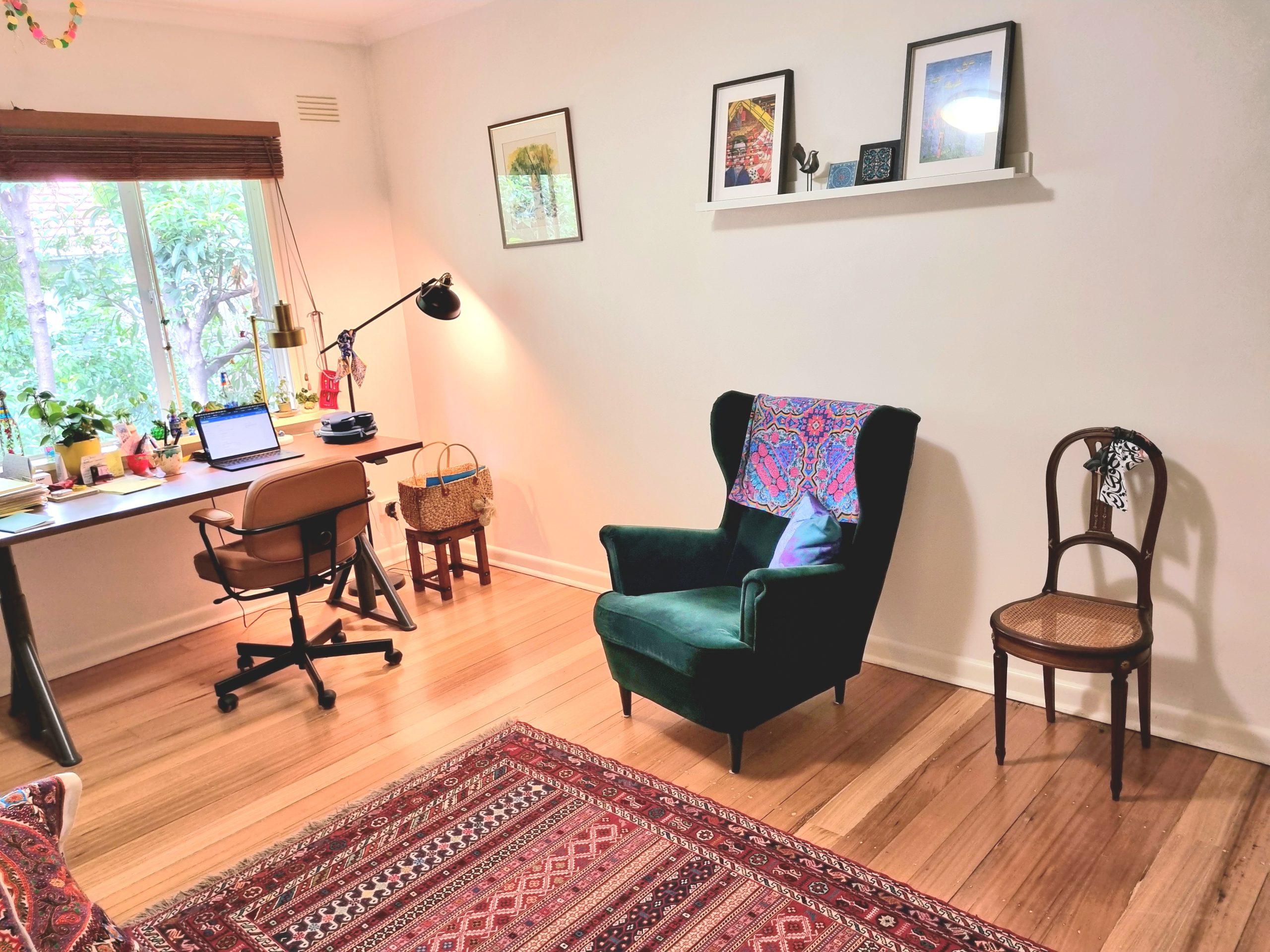Patient Information
Sessions follow an analytic structure grounded in Freudian psychoanalytic theory and further developed by Jacques Lacan and his school. The structure establishes the conditions that make working together in therapy possible.
"Desire is the metonymy of being." (Seminar VI: Desire and Its Interpretation) Jacques Lacan
Structure of Sessions for Psychoanalytic Therapy / Psychotherapy
In psychoanalytic therapy, the regularity of sessions serves as the scaffolding that sustains analytic treatment. We may initially begin with one, may be two sessions per week, and as the therapy work unfolds, we may introduce additional sessions over time — such as a third or fourth — this is subjective and different for each one. It is always through talking together in sessions.
The psychoanalytic structure goes beyond logistics; it forms the symbolic framework that allows the unconscious to express itself within the analytic session through the topics you choose. Sessions serve as a consistent placeholder for the unconscious, providing you with a space to speak, encounter yourself, and engage with the gaps that have given rise to anxiety and unease in many areas of your life.
We approach anxiety in a transformative way, without pathologising it. According to psychoanalytic theory and research literature, anxiety often signals something important that is illusive or unknown to us. Through our shared commitment to meeting regularly, we create the conditions for these unconscious gaps and the anxiety or defense mechanisms they produce, in order to be explored and gradually worked through. You are always the one who decides what to bring and discuss to each session.
The analytic discourse we engage in is of a different order, distinct from the
dialogues one might share with family, friends, or partners. The psychoanalytic exchange is a dialogue with the Other, the Other of language, which is an enigmatic dimension that exceeds spoken language and sometimes even escapes symbolisation, appearing in various forms, such as sadness, trauma, confusion, grief and anger. For example we might know we are sad, but we don't know why. Speaking in therapy might make this a little clearer over sessions.
As an analyst, I position my presence within this structure, creating the space for you, the patient, to take centre stage. The work is not driven by my agenda - rather, it is about fostering the conditions necessary for you to say more about the desires, anxieties or issues that may be troubling yourself.

Book Appointment
Appointments are offered based on current openings, respecting the unique timing and readiness for each individual's work. You're welcome to contact Bita, and together, we can work out what may be troubling you.
Fees, Rebates & Payments

Theory: The Subjective Value of Therapy
The question of payment or cost is often linked to the notion of value - how individuals attribute significance to certain experiences or objects in their lives. In the context of therapy, payment functions as a symbolic recognition of the value one places on their desire to speak at a particular point in time. This value is subjective and influenced by various factors, including affordability, one's timing and availability.
Payment also marks a clear distinction between therapy and everyday conversations with friends, family, or others. A therapeutic encounter is not a casual one - it involves putting one’s being to work through the act of speaking in the sessions.
This is not always easy. Speaking freely can stir sadness or discomfort at times. Specially in the early weeks and months, when we begin therapy. We feel distress or sadness sometimes after therapy sessions.
Because, as things are processed and articulated, thoughts that were prohibited elsewhere, have the space to be spoken, sometimes for the first time, and be heard differently, in a session. Hopefully resulting in moments of curiosity and reflection for you between sessions.
Through this sustained and structured work, carried out together across sessions with an agreed regularity - we begin to address underlying difficulties. This is a different kind of work: it is therapeutic work.
Research literature also shows that payment can support the therapeutic process by encouraging patients to make a commitment to their treatment, to attend sessions and engage in the work for themselves.
This is why, when we later discuss the possibility of working together in long-term psychotherapy - beyond the Medicare rebate period - the fee becomes part of the conversation and may be adjusted to support the treatment.
Our Shared Commitment
Each analysand is allocated a dedicated time in my diary, and payment is required for both attended and missed sessions. It's a time that is reserved for you according to our agreed frame. We can always talk about changes together in the sessions.
With adequate notice, alternative arrangements may be possible. Part of your fee covers the costs of maintaining a high quality practice, including professional responsibilities, supervision, memberships and essential expenses.
FAQs
These FAQs provide an overview of the structure of psychoanalytic sessions, general psychotherapy principles, and the framework I use in my practice.
How will my private information be handled, and how should I reach you for inquiries?
All electronic data and information will be handled according to the Australian government regulations, Business Victoria standards, and best practice guidelines for private practice psychologists. You can find more information about my privacy practices. I am also happy to answer your questions.
To discuss any inquiries, whether about treatment or a report, you will need to book a session. I will address your problem or question during the session. The brief phone call we have is solely for the purpose of scheduling an appointment, and not for answering questions about your treatment or providing opinions over the phone.
How do I book an appointment?
You can request an appointment using the form, and I will return your call within a day to confirm a time. No referral is needed, and there are no wait times, as I run my own practice. We can typically find an initial time to meet and then discuss the details of our treatment agreement and weekly sessions when we meet. If you prefer, you can call me at 0433 781919 or send a WhatsApp message, which is especially helpful if you're contacting from outside Australia or find it more convenient.
How long is a psychoanalytic session?
The duration of a session isn't fixed but follows the principle of variable-length sessions according to lacanian psychoanalytic theory.The psychoanalyst ends a session when something significant emerges, a shift, or a moment that touches at the core of your unconscious. The session respects the subjective rhythm of your unconscious, rather than clock-time, allowing the work to unfold in a way that highlights the symbolic aspects to progress the treatment.
Do I need a referral or diagnosis to see Bita?
I don't need a referral to see you. It's optional. Furthermore, you do not need to be diagnosed with a psychological disorder to undertake psychological treatment. Some people are aware of a problem and want to address it. We can discuss your concern in the sessions. However if you do opt to use Medicare, your doctor is required to document a diagnosis in your file (I don't have access unless you give me a referral) and it appears in your health records. If you give me a referral I have to write back to the GP at some point and give a summary for your public medical records. If you do not give me a referral, my notes stay with me and aren't shared. As a psychoanalytic psychologist I do not give categorical diagnoses, unless individuals specifically see me for a clinical report.
Can I use Medicare for my treatment?
In Australia, Medicare gives $96 and only for six therapy sessions. This program was created to encourage Australians who haven't tried therapy before to give it a go. That said, the six-session limit isn't based on scientific evidence. The duration of treatment is not determined by a fixed number of sessions or a predetermined timeline. Instead, it is based on the subjective experience of each person in treatment.
Most psychological treatment in Australia happens in private practice and isn't adequetly funded by public or private insurance. With psychoanalysis, it's important to understand that it's a long-term weekly commitment. It's about working with the unconscious knowledge, which is based in transference taking time to develop through free association, dreams, and other unconscious formations. Gradually uncovering how you might be contributing to your own suffering without realising it. While it takes dedication, the insights and changesthat come from this mode of working together are worthwhile and liberating.
Review the FAQs for children.
How do I access Medicare rebates for psychology?
To access Medicare rebates, you'll need to ask your GP to create a Mental Health Care Plan (MHCP) for you based on a diagnosed mental health condition. In addition to the MHCP, you must also request a valid referral letter from your GP to see a psychologist. The referral letter must include a valid Medicare diagnosis and specify the number of rebates (typically, Medicare rule allows an initial 6 rebates, followed by 4 additional rebates after a GP review).
Please note that the Medicare rebate amount and eligibility for various services are set by Medicare, not by the psychologist. To ensure you meet the requirements, it's important that your referral letter from your GP aligns with Medicare's guidelines. It is your responsibility to schedule the necessary reviews with your GP for further rebates.
Review the FAQs for children.
What is a valid Medicare referral for psychology?
According to the Department of Health, a valid Medicare referral for psychology must include the following information. It is your responsiblity to ask your doctor to include this information on your referral letter. Without this information I cannot lodge a claim to Medicare
- Date of referral and doctor's signature
- Medicare diagnosis
- Patient's Medicare number
- Patient's name (correct spelling as it appears on Medicare records)
- Patient's date of birth
- Patient's residential address
- Presenting problem and previous diagnoses
- Up-to-date list of medications
- Number of rebates (a maximum of 6 rebates in the first referral, followed by a re-referral for 4 additional rebates)
- Doctor's provider number
If you bring a referral letter you are automatically giving consent to the psychologist to communicate with your GP, and as per Medicare requirement psychologists have to write a brief letter to your GP giving an opinion.


